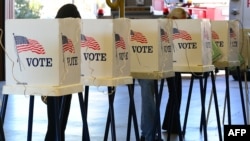Over 70 percent of Asian-Americans voters cast their ballot for President Barack Obama in 2012, but a closer look at exit polling data reveals some nuances in a group that is often lumped together.
For example, 96 percent of Bangladeshi-Americans voted for Obama, while only 44 percent of Vietnamese-Americans did, according to the data collected by the Asian American Legal Defense and Education Fund (AALDEF), a national organization that protects and promotes the civil rights of Asian-Americans.
“Very often the [Asian-American] community is painted with broad generalizations,” said Glenn Magpantay, Democracy Program Director at AALDEF. “Can you really just paint them as monolithic? To some extent, but there was some variation.”
Vietnamese-American voters were outliers in several categories, including party affiliation. Whereas 57 percent of Asian-Americans said they belong to the Democratic Party and 14 percent identified Republican, Vietnamese-Americans were the opposite, with 37 percent belonging to the Republican Party and 26 percent saying they identified as Democrats.
Magpantay says the reason is simple: “communism.”
“They came to the U.S. fleeing a communist regime,” he said. “It was a [Republican] administration in the White House at the time, and Nixon had fought the communist regime.”
Chinese-Americans were the least likely to affiliate with a party. Magpantay suggested that only one third of Chinese-Americans belong to a party, compared with 71 percent among all Asian-Americans, because of the negative association of the word party with the Communist Party in China.
On the issues, Asian-Americans ranked jobs and the economy as the most important, followed by health care and immigration.
While 65 percent of all Asian-Americans said they strongly support or support comprehensive immigration reform, the level of support was considerably lower among Chinese-Americans (54 percent) and Vietnamese-Americans (49 percent). Koreans, Bangladeshis and Pakistanis gave the most support to immigration reform.
Finally, the poll also looked at whether Asian-Americans can vote accurately using English language ballots. Data revealed that there are only three ethnic groups, Chinese, Vietnamese and Koreans, who likely need to have ballots available in language.
For example, 96 percent of Bangladeshi-Americans voted for Obama, while only 44 percent of Vietnamese-Americans did, according to the data collected by the Asian American Legal Defense and Education Fund (AALDEF), a national organization that protects and promotes the civil rights of Asian-Americans.
“Very often the [Asian-American] community is painted with broad generalizations,” said Glenn Magpantay, Democracy Program Director at AALDEF. “Can you really just paint them as monolithic? To some extent, but there was some variation.”
Vietnamese-American voters were outliers in several categories, including party affiliation. Whereas 57 percent of Asian-Americans said they belong to the Democratic Party and 14 percent identified Republican, Vietnamese-Americans were the opposite, with 37 percent belonging to the Republican Party and 26 percent saying they identified as Democrats.
Magpantay says the reason is simple: “communism.”
“They came to the U.S. fleeing a communist regime,” he said. “It was a [Republican] administration in the White House at the time, and Nixon had fought the communist regime.”
Chinese-Americans were the least likely to affiliate with a party. Magpantay suggested that only one third of Chinese-Americans belong to a party, compared with 71 percent among all Asian-Americans, because of the negative association of the word party with the Communist Party in China.
On the issues, Asian-Americans ranked jobs and the economy as the most important, followed by health care and immigration.
While 65 percent of all Asian-Americans said they strongly support or support comprehensive immigration reform, the level of support was considerably lower among Chinese-Americans (54 percent) and Vietnamese-Americans (49 percent). Koreans, Bangladeshis and Pakistanis gave the most support to immigration reform.
Finally, the poll also looked at whether Asian-Americans can vote accurately using English language ballots. Data revealed that there are only three ethnic groups, Chinese, Vietnamese and Koreans, who likely need to have ballots available in language.








